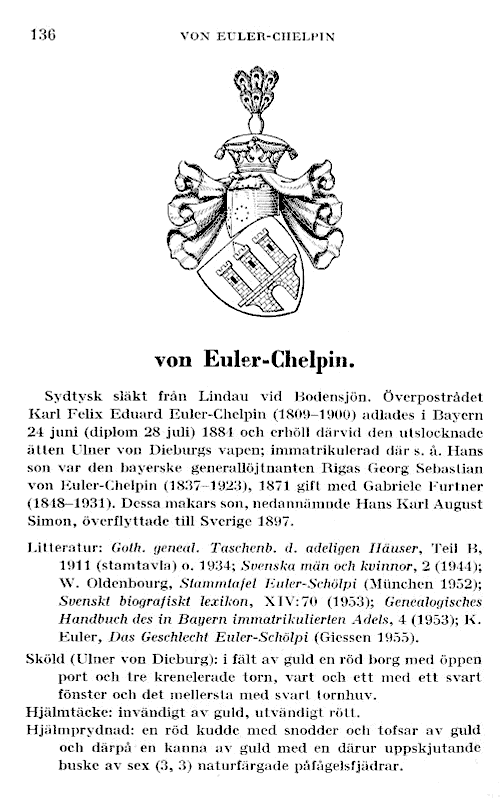


Hans von Euler-Chelpin; (1873-1964) Nobel 1929 for chemistry
& [his son] Ulf von Euler (1905-1983) Nobel 1970 for medicine
Or, a castle triple towered Gules couped, port of the field and
windows Sable,
the middle tower with a pointed roof of the last.
Crest : A pillow gules with
tassles Or, supporting a
jug Or with six
peacock feathers [3 and 3] Proper.
Mantling : Gules and Or.
These are the arms of an extinct family (Ulner von Dieburg)
which the
Euler-Chelpin family received
when they were ennobled (in Bavaria) in 1884.
Below is a reproduction of the beginning of the article dedicated to
Euler-Chelpin in the 1970 edition of
"Ointroducerad adels kalender"
(Calendar of Unintroduced Nobility).

[Jan Böhme, 2007-07-26]
Hans von Euler-Chelpin was German by birth.
He first set foot in Sweden at the age of 24,
and became a permanent resident only at 35.
(He was a longtime Swedish citizen when he received the Nobel prize,
for research performed in Sweden.)
Not surprisingly, he always spoke Swedish with a pronounced German accent.
According to Jan Böhme's father-in-law,
who was a student of von Euler-Chelpin in the 1930's,
the story goes that Euler-Chelpin had proposed to
his second wife (Elisabeth af Ugglas) thusly:
"Miss, would you consider
translating your family name into German?"

[Jan Böhme, 2007-08-12]
The [above] arms of von Euler-Chelpin are displayed with a
coronet on a closed helmet (considered a commoner's helmet)
probably to avoid possible charges of misrepresentation...
In Sweden, the open helmet (with visor) is restricted to nobility, although
this seems tolerated for members of bona fide
noble families that have not been introduced to the swedish House of Nobility
(and are thus, technically, commoners).
The legislation restricting open helmets to noblemen dates back to 1762.
For the next 40 years or so, members of bona fide
noble families of foreign extraction could obtain introduction to the House of Nobility
through a process called naturalisation,
which didn't demand a letter patent from the Swedish King.
At the time, there were thus essentially no noble Swedish citizens whose
family didn't have a seat in the House of Nobility.
This has changed in the past two centuries,
with an influx of individuals belonging to families considered noble in their
countries of origin but whose nobility has not been formally recognised in Sweden.


